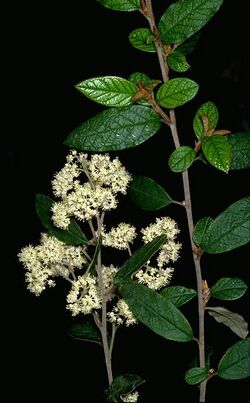Biology:Pomaderris ferruginea
| Rusty pomaderris | |
|---|---|

| |
| Pomaderris ferruginea in the Australian National Botanic Gardens | |
| Scientific classification | |
| Kingdom: | Plantae |
| Clade: | Tracheophytes |
| Clade: | Angiosperms |
| Clade: | Eudicots |
| Clade: | Rosids |
| Order: | Rosales |
| Family: | Rhamnaceae |
| Genus: | Pomaderris |
| Species: | P. ferruginea
|
| Binomial name | |
| Pomaderris ferruginea Sieber ex Fenzl[1]
| |
| Synonyms[1] | |
| |
Pomaderris ferruginea, commonly known as rusty pomaderris,[2] is a species of flowering plant in the family Rhamnaceae and is endemic to south-eastern continental Australia. It is a shrub with rusty-hairy stems, egg-shaped leaves, and clusters of cream-coloured, whitish or yellow flowers.
Description
Pomaderris ferruginea is a shrub that typically grows to a height of 1.5–4 m (4 ft 11 in–13 ft 1 in), its branchlets covered with shaggy, rust-coloured hairs. The leaves are egg-shaped or narrowly egg-shaped, 30–90 mm (1.2–3.5 in) long and 15–40 mm (0.59–1.57 in) wide, the upper surface glabrous and the lower surface covered with curved, rust-coloured hairs. The flowers are cream-coloured and borne in pyramid-shaped to hemispherical panicles 30–100 mm (1.2–3.9 in) wide on the ends of branches, each flower on a pedicel 1.5–4 mm (0.059–0.157 in) long with bracts at the base but that fall off as the flower opens. The floral cup is 1.0–1.5 mm (0.039–0.059 in) long, the sepals 1.5–2.5 mm (0.059–0.098 in) long but fall off as the flowers open, and the petals are 1–2 mm (0.039–0.079 in) long. Flowering occurs from August to October.[2][3][4][5]
Taxonomy
Pomaderris ferruginea was first formally described in 1837 by Eduard Fenzl in Enumeratio plantarum quas in Novae Hollandiae ora austro-occidentali ad fluvium Cygnorum et in sinu Regis Georgii collegit Carolus Liber Baro de Hügel from an unpublished description by Franz Sieber.[6][7] The specific epithet (ferruginea) means "rust-coloured".[8]
Distribution and habitat
Rusty pomaderris grows in open forest, often along streams from south-east Queensland, along the coast and tablelands of New South Wales and as far east as Bairnsdale in Victoria.[2][3][4]
References
- ↑ 1.0 1.1 "Pomaderris ferruginea". Australian Plant Census. https://biodiversity.org.au/nsl/services/apc-format/display/93990. Retrieved 13 February 2022.
- ↑ 2.0 2.1 2.2 Harden, Gwen J.. "Pomaderris ferruginea". Royal Botanic Garden Sydney. https://plantnet.rbgsyd.nsw.gov.au/cgi-bin/NSWfl.pl?page=nswfl&lvl=sp&name=Pomaderris~ferruginea.
- ↑ 3.0 3.1 Walsh, Neville G.. "Pomaderris ferruginea". Royal Botanic Gardens Victoria. https://vicflora.rbg.vic.gov.au/flora/taxon/ee879a28-7801-4f96-aae1-84dfda3527d2.
- ↑ 4.0 4.1 Wood, Betty. "Pomaderris ferruginea". Lucid Keys. https://apps.lucidcentral.org/plants_se_nsw/text/entities/pomaderris_ferruginea.htm.
- ↑ Robinson, Les (1991). Field guide to the native plants of Sydney. Kenthurst, NSW: Kangaroo Press. p. 204. ISBN 0864171927.
- ↑ "Pomaderris ferruginea". Australian Plant Name Index. https://biodiversity.org.au/nsl/services/rest/instance/apni/517234. Retrieved 13 February 2022.
- ↑ Endlicher, Stephan (1837). Enumeratio plantarum quas in Novae Hollandiae ora austro-occidentali ad fluvium Cygnorum et in Sinu Regis Georgii collegit Carolus liber baro de Hügel. p. 21. https://babel.hathitrust.org/cgi/pt?id=chi.64405481&view=1up&seq=31. Retrieved 13 February 2022.
- ↑ Sharr, Francis Aubi; George, Alex (2019). Western Australian Plant Names and Their Meanings (3rd ed.). Kardinya, WA: Four Gables Press. p. 198. ISBN 9780958034180.
Wikidata ☰ Q7227195 entry
 |

